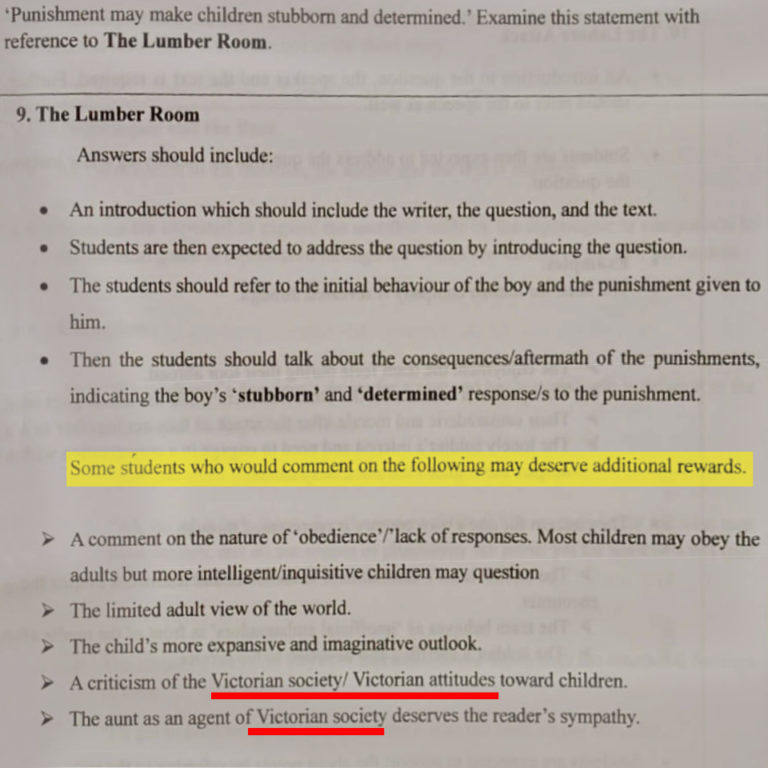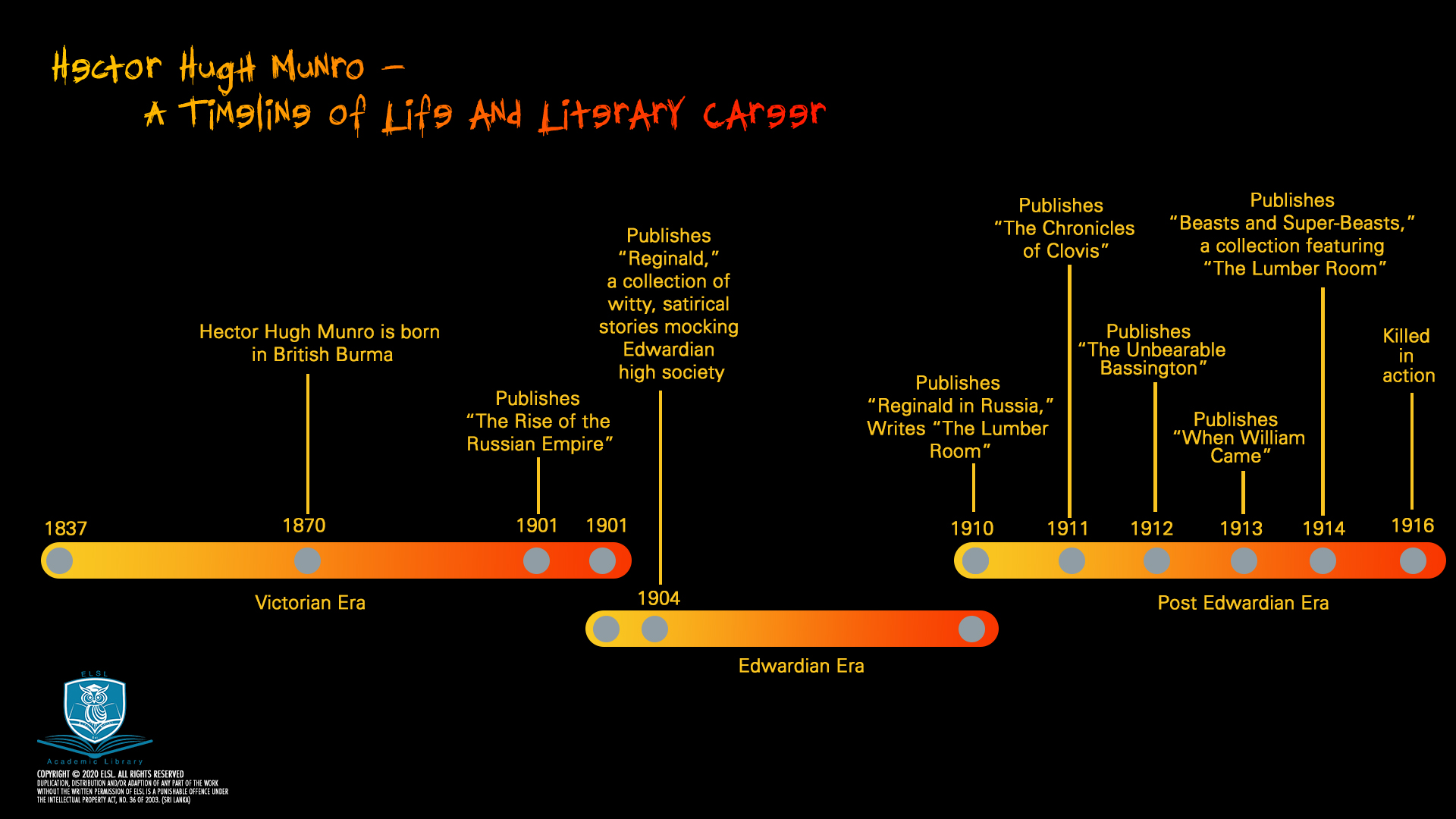Saki, Victorian Edition: A Masterclass in Historical Revisionism by the Department of Examinations
The Department of Examinations, the government institution responsible for overseeing Sri Lanka’s General Certificate of Education Ordinary Level (G.C.E. O/L) examinations, has once again been brought under scrutiny for a glaring mistake in the marking scheme for “The Appreciation of English Literary Texts” subject (G.C.E. O/L 2023). The error in question involves misidentifying the period to which renowned British author, Hector Hugh Munro, better known by his pen name Saki, belongs. According to the marking scheme, Munro is erroneously classified as a Victorian-era writer, based solely on his birth year. This mistake is not only a reflection of the department’s incompetence but also a concerning indication of how the casual disregard for accuracy in educational matters can have far-reaching consequences.
Questionable Standards of a Government Institution
The Department of Examinations holds a pivotal role in shaping the academic futures of millions of Sri Lankan students. This is an institution meant to provide precise, accurate, and well-researched information to guide students, teachers, and the educational community at large. However, errors such as this one—misclassifying a literary figure—raise serious questions about the standards maintained by the department.
When an educational body entrusted with such significant responsibilities fails to ensure accuracy, it undermines the integrity of the entire system. The Department of Examinations has an obligation to present information that is not just factual but also carefully reviewed and validated before being disseminated to schools and students. The failure to do so reveals a systemic lack of professionalism and thoroughness that has regrettably become all too common in government institutions.

Carelessness and Ignorance: A Marking Scheme with Fundamental Mistakes
The marking scheme for the G.C.E. O/L examination plays a critical role in shaping how students are evaluated. It ensures that assessments are consistent and fair across the board, allowing students to demonstrate their knowledge and skills in an objective manner. So, it is both astonishing and concerning that an error as basic as misidentifying the literary era of a well-known author was allowed to slip through.
Hector Hugh Munro, born in 1870, may have lived during the tail end of the Victorian period, but his works were written and published during the Edwardian era (1901-1910). This distinction is not mere trivia—it is vital to understanding the context in which his works were created. Munro’s writing, characterised by satire, dark humour, and criticism of societal norms, was deeply reflective of Edwardian sensibilities. To classify him as a Victorian writer distorts both the historical context of his work and the intellectual legacy he left behind. It is baffling that such a fundamental oversight could have been overlooked by the department’s examiners, who are supposed to be experts in the field.
The fact that this marking scheme was not thoroughly proofread before its release is a glaring testament to the carelessness and ignorance that plagues the system. It is not only the duty of the examiners to produce accurate marking schemes but also their responsibility to ensure that these documents are meticulously reviewed to avoid such mistakes. If such an error is allowed to persist, what does it say about the credibility of other aspects of the examination system?

The Consequences: Marking Intelligent Students Unfairly
The consequences of this mistake are profound and detrimental to students. Many students in Sri Lanka approach the G.C.E. O/L examination with a strong academic foundation. They prepare for months, sometimes years, to ensure that they excel in their subjects. However, a mistake in the marking scheme such as this can undermine all their hard work. By misclassifying Munro, a student who correctly identifies him as an Edwardian author may lose crucial marks due to an error that was completely out of their control. Conversely, a student who incorrectly follows the marking scheme and provides the wrong period might be awarded marks for their ignorance.
This flaw not only penalises students who know their material well but also rewards those who might not possess a clear understanding of the subject. Such unfair marking practices distort the results of the examination and harm the future prospects of diligent students. The G.C.E. O/L examination is one of the most competitive exams in Sri Lanka, and every mark counts. To lose marks over something as simple as a misclassification is an insult to students who invest so much time and energy into their studies.
Establishing Wrong Information in the Teaching Community
Educational institutions and teachers rely heavily on government-published materials to guide their curricula and prepare students for exams. This erroneous marking scheme, if not corrected promptly, will undoubtedly be used as a reference by educators throughout the country. As a result, the misinformation will likely be passed on to generations of students, perpetuating a cycle of ignorance. Teachers who follow these flawed guidelines may unknowingly spread inaccurate historical and literary knowledge, further eroding the quality of education.
Moreover, when incorrect information becomes institutionalised in the education system, it fosters a culture of complacency among educators and examiners. They may begin to take government documents at face value without critically evaluating their accuracy, which could lead to even more egregious errors in the future.
The G.C.E. O/L Examination: The Gateway to Sri Lanka’s Future
The G.C.E. O/L examination is a critical juncture in the academic journey of Sri Lankan students. It is not just an exam; it is the gateway to higher education and, ultimately, to one’s career prospects. Success in this examination often determines whether a student will go on to university, vocational training, or enter the workforce. Therefore, the stakes are extraordinarily high.
Given the pressure on students to perform well, the impact of such mistakes in the marking scheme cannot be underestimated. Students who are already stressed by the intense pressure to succeed may face even more anxiety as they are forced to grapple with the fear of being penalised for factors beyond their control. It is a well-known fact that Sri Lanka has one of the highest student suicide rates in the world, a tragic statistic driven in large part by the immense academic pressures students face.
The government, therefore, must take full responsibility for ensuring that the education system works fairly, efficiently, and accurately. The mental health of our youth, particularly in the face of examinations that determine their future, should be a paramount concern. Errors like these further burden students who are already under immense emotional strain. By failing to uphold the integrity of the G.C.E. O/L examination, the Department of Examinations is contributing to the very problems that have devastating consequences for our young people.
A Call for Accountability and Reform
The mistake in the marking scheme for “The Appreciation of English Literary Texts” serves as a stark reminder of the urgent need for accountability within Sri Lanka’s education system. The Department of Examinations must take immediate action to rectify this error and review all future marking schemes with greater care and precision. It is not enough to simply blame oversight or negligence; the system must be reformed to ensure that such mistakes never happen again.
The government has an ethical duty to safeguard the well-being and futures of Sri Lankan students. In a society where academic success can determine the trajectory of one’s life, such institutional missteps cannot be tolerated. The time has come for the Department of Examinations to prove that it values accuracy, fairness, and above all, the success and mental health of Sri Lanka’s young generation.

